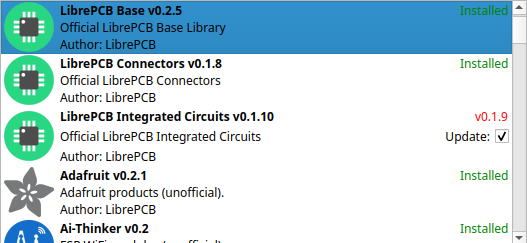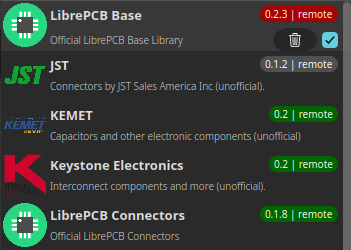
@ubruhin
October 17, 2024
Today I am very proud to announce that the LibrePCB project receives support from the NGI0 Commons Fund to develop LibrePCB 2.0. This allows us to implement a lot of exciting features and improvements, see details below.
About the NGI0 Commons Fund
NGI0 Commons is a fund established by NLnet with financial support from the European Commission’s Next Generation Internet programme, and additional funding by the Swiss State Secretariat for Education, Research and Innovation (SERI).
It’s the second time we receive funding through NGI0. LibrePCB 1.0 and 1.1 were major outcomes of our first grant, together with our first video tutorials — important milestones in the history of LibrePCB.
LibrePCB 2.0 Roadmap
The overall goal of the new grant is to release LibrePCB 2.0. Due to the huge amount of work, I expect it will keep me busy for the next 12 months. But some of the new features will be made available earlier in a LibrePCB 1.2 release. And of course due to the nature of software development, plans might need to be adjusted if unexpected issues occur.
New Features
The following features are planned to be contained in either LibrePCB 1.2 or 2.0:
-
Schematic buses
-
Images in schematics
-
KiCad library import
-
Interactive HTML BOM
-
Specctra DSN export / SES import
-
Advanced board design rules
-
And several more…
C++ → Rust
In addition, the plan is to start moving away from C++ towards the Rust programming language. Generally I like to work with proven, mature, stable, widely available tooling which was one reason to choose C++ more than 10 years ago when I started with LibrePCB. C++ is simply available on any platform and code written 10 years ago is still working fine today, so we can focus on new features rather than keeping the code compatible with new toolchain versions. However, more than a decade later, the situation is a bit different:
-
Rust 1.0 was released ~2 years after the LibrePCB project was born
-
Today, ~9 years after its 1.0 release, it’s a widely used programming language, backed by large companies, and probably will last for a long time
-
Rust provides not only a compiler, but a whole ecosystem including a build system and package management to simplify project administration
-
Although Rust is also a low-level, fast, non-garbage-collected programming language, it’s much safer than C++ (memory safety, compile-time checks, …), leading in more reliable applications
-
There exist tons of Rust libraries, which are way easier to integrate than C++ libraries which are difficult to share
-
The Rust community is already huge (with lots of smart people) and still growing fast
Given the advantages of Rust over C++, I think we should really give it a try and do a first attempt of integrating Rust into the LibrePCB code base. Of course a complete migration is totally out of scope — we have to start with small steps and gather experience with C++ interoperability.
Completely New UI
However, our biggest problem at the moment is the user interface. As you might have noticed, LibrePCB consists of many individual windows and modal dialogs, packed full of controls. With every new feature, the UI gets more and more cluttered and thus more complicated (beside the inconvenience of having many windows opened at the same time). This does not follow our vision of an easy to use, intuitive UI.
Unfortunately, with our current UI toolkit (QtWidgets) it’s almost impossible to design more dynamic, flexible, responsive UIs. Also it consumes a lot of time, even simple things in the UI require to write tons of error-prone code. In addition, the platform-dependent look of Qt often leads to issues like unreadable text colors or layouting errors. All these things caused the development of new features to stuck because either something is almost impossible to implement with Qt, or I’m afraid of writing so much code for it.
As an example, one item in this custom list view requires ~580 lines of code:
To pave the way for new features (and in general to future-proof LibrePCB), I was therefore looking for alternatives to QtWidgets. Unfortunately there aren’t many options:
-
Stick with QtWidgets, but use custom stylesheets to heavily adjust its look (example: OBS Studio) — that even increases the effort for UI development and doesn’t fix the limitations of QtWidgets.
-
QML: Luckily it’s part of Qt so it wouldn’t be a huge new dependency. Probably it would be usable for LibrePCB, but it’s error-prone because it gets interpreted at runtime, and the licensing situation of QML (or Qt in general) doesn’t really go into the right direction (getting more and more commercial).
-
Slint: A pretty young UI framework implemented in Rust (but providing a C++ API), with a declarative UI language which gets interpreted at compile-time and a very powerful live preview. Unfortunately it still lacks a lot of basic features and I haven’t seen any large project using Slint yet, so there’s not really a proof that it will work for LibrePCB.
Of course there are many other UI frameworks out there, but nothing really suitable for LibrePCB (no C++ API, too bloated, not cross-platform, …).
At first glance, QML seemed to be the only reasonable way to go, despite its own issues. However, after playing around with Slint too, I was impressed by its very neat declarative language and the powerful toolchain — compared to QML, it’s a real pleasure and very efficient to create UIs. The interaction with C++ is very basic, but seems to cover the most important use-cases. And even though many features are missing (e.g. menus, tooltips, drag&drop, …), lots of things could be implemented manually.
During my experiments, I tried to quickly create a listview like the one from the library manager. Compared to the ~580 lines of code for QtWidgets, a custom list item in Slint takes only ~200 lines of code, and it’s even more responsive (e.g. hover effects):
Now I’m convinced we should give Slint a real chance, thus it’s part of the LibrePCB 2.0 roadmap.
I hope you are now as excited as I am! 😀


